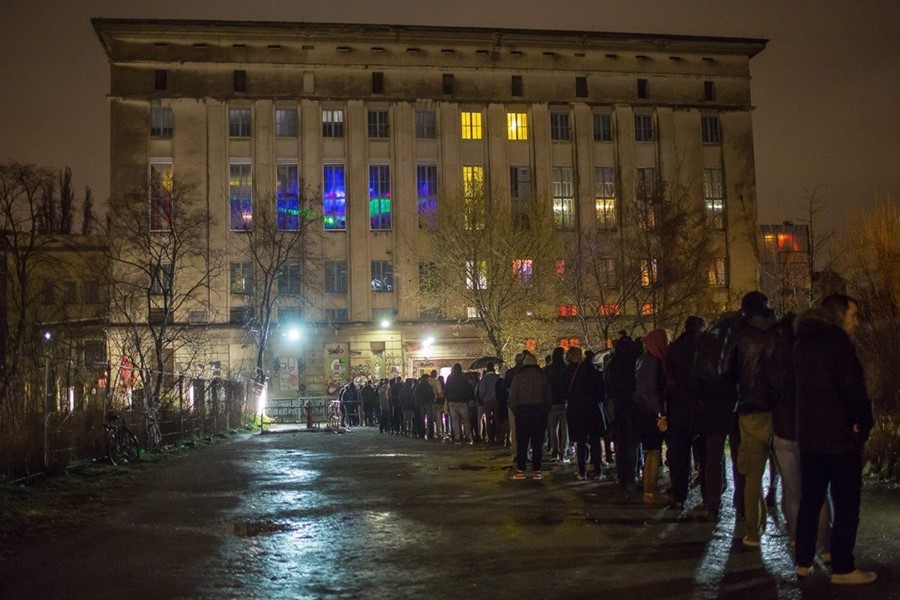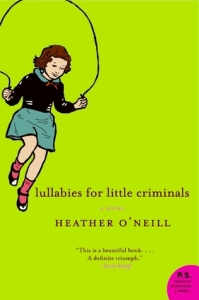This month my reading will be focused very much on (mainly but not exclusively Anglo) expats. I don’t know if it’s my own plans for eventually moving to Berlin that have made the subject particularly pertinent and visible, or if it’s a publishing trend, but quite a few recent books seem to be dedicated to life in Berlin. The city that no one wanted to move to before 1990 and which then became super-trendy (and increasingly expensive). It’s the trendiness, a young person’s view of Berlin, that I found in the first three books I read: they talk about relatively recent periods in the town’s history rather than the more edgy grunge and squatter heaven of the early 1990s. None of these books struck me as being truly preoccupied or interested in the city itself – instead, these people were looking for their own selves or for connection or love or to fuel their addictions. They all made me feel tired and old.
Oscar Coop-Phane: Tomorrow Berlin, transl. George Miller, Arcadia, 2015.
Three young men, each with a complicated back story (and the first part of the book dwells perhaps a little too much on their back stories before it brings them all together in Berlin), find themselves couch-surfing and partaking in the crazy 24 hours drinks, drugs, sex and club culture of 2000s Berlin. Tobias is originally German but has spent most of his life outside his country of birth; abused by a family member in his childhood, he has now turned to prostitution and fleeting affairs until he discovers he has AIDS. Armand rebels against his bourgeois family by becoming an artist, and leaves Paris for Berlin when the great love of his life doesn’t quite turn out the way he envisaged it. Franz thought he could pull himself up by his bootstraps by excelling at his studies, but discovers he will always be looked down upon by high-class Germans, so he starts dealing drugs instead. I wasn’t entirely convinced we needed three main characters in this quite short novel (170 small pages) – their experiences and voices did not seem that differentiated.
With graphic descriptions of drug-taking and of homosexual and heterosexual encounters in grimy toilets, it is very much a ‘hedonism as a desperate cry for escape from one’s own trauma’ sort of book – and at times it almost succeeds in convincing me of this. The chapters alternate between the three men, who finally meet up and become friends – or at least, fellow consumers of the Berlin nightlife circa 1998-2008. You might almost describe this as Trainspotting with a more glamorous backdrop. There are some acute observations about Berlin (the author lived there for some time), but perhaps not nearly enough to give me a strong sense of place.
What saves the book from just being a blow-by-blow account (pun intended) of random encounters and excessive clubbing are the moments of reflection. Armand keeps a notebook, and we are often privy to Tobias’ innermost thoughts. Every now and then we get some passages about the city itself, which might be the author intervening or could be written by one of the characters – these passages were my favourite to read:
The streets are wide and people walk around, as though nothing could happen to them, as if here more than elsewhere people take time to live. People are a bit skint but they get by. The soups are good. People smoke in the cafes since it would be crazy not to. They work away on a laptop at some obsession. You sense Europe is around you, all its languages mixing and answering each other.
This contrasts a bit with Tobias’ first impressions of the city when he arrives fresh from Paris:
The sky’s so grey here. No sun or clouds. And buildings, so shiny and low! It’s a far cry from Baron Haussmann’s embellishments. Everything looks like it has a use. It’s sad all the same, a city where everything is useful. What about poetry, where do they put that? Maybe they have little parking lots for sonnets and hangars and factories for ballads.
I particularly enjoyed the description of winter in Berlin:
For several weeks, the street has lost its old appeal. Its heart is frozen, its surface covered in snow… No one panics; people here are used to putting on boots, taking a shovel to clear their doorways. It’s as though a parallel life is activated: bikes and tables outside cafes are put away, hats and tights are taken out, daylight becomes unfamiliar, there are invitations to people’s flats for soup or a cup of tea.
But there simply weren’t quite enough of those passages. Instead, we witness the car crash of people sabotaging their own lives.
Calla Henkel: Other People’s Clothes, Sceptre, 2021.

Calla Henkel is an American writer and playwright/director living in Berlin and in her debut novel she shows us the hedonistic side of Berlin from the point of view of two American students on their year abroad. Rather than a ‘running away from’, this is a novel of ‘running towards’. Zoe and Hailey are art students in New York, who are keen to reinvent themselves, desperate to be hip and memorable in a city that doesn’t seem to be that welcoming to them. Their art classes are virtually non-existent, but they manage to find a sublet in a grand old building where nothing seems to work properly. So they spend their days trying to track down the cool crowd and their nights being refused entry to Berghain.
Drug-taking, drinking, bulimia and sexual encounters are abundantly described, but there is an added twist to keep the story from becoming a wearisome episodic account. They suspect that their landlady, a prolific novelist, is spying on them to write a novel about them, so they decide to put on a show for her – give her something to write about. Set in 2008/9, the novel is full of references to the Amanda Knox case, with one of the main characters following it quite obsessively, so it’s no surprise when the novel takes a darker turn… but perhaps a little too late for my patience.
While the dialogue is often very funny and compelling, it feels to me like the author is trying to squeeze too many strands into this novel, or else couldn’t quite figure out what, if any, genre it was supposed to fit. It has it all: social media feeding frenzy, life as art, female friendships, envy and jealousy, gay and straight relationships, partying lifestyle, obsession with celebrity, being a babysitter in a wealthy family, plus the chilling feeling of being spied upon. If the men in Coop-Phane’s novel filled me in equal measure with disgust and pity, these girls annoyed me with their self-absorption, their spoilt and pretentious attitudes. Yet in both cases, I was pained to see how disinterested they were in getting to know the life of real, everyday Berliners outside their drug-taking or artistic bubble.
Which makes me wonder if the backdrop of Berlin was essential – it felt like this story could have taken place in any other big city with a lively nightlife. Occasionally, however, there is a rather more vivid description to convey the atmosphere:
The dance floor was filled with languages and English accented in French, Italian and others I couldn’t place, everyone expertly stepping to electronic music in quick sharp movements, all dressed in layers of black… A Venezuelan girl starting a gallery. A Croatian dancer making work-out tapes with artists. A spiky-haired guy in a black hoodie talking about Marx… It reminded me of the bar in Star War, all those outer-space creatures from planets I had heard of grinding on each other and smoking cigarettes.
Amy Liptrot: The Instant, Canongate, 2022.
At least this book has no aspirations to be fictional, but is a memoir of the year that the author moved to Berlin. After ten years of living in London and descending into alcoholism and drug-taking, Liptrot had reconnected with nature and herself in Orkney in her much-lauded first book The Outrun. However, after a while the island isolation becomes too much for her and she goes to Berlin on a whim, without speaking the language or a job or place to stay.
I didn’t choose Berlin for a particular reason… You are free to invent your identity in a new city. I want to act like I’m still in my twenties, maybe get a nose-piercing and an undercut, start beng polyamorous, making scultpures. I’m attracted to what I think of as Berlin style: Cabaret-via-Cold War, bicycles, minimal techno, black clothes.
Ah, there come the clichés again! The elements which resurface in both of the books above. Liptrot too goes to Berghain, but she writes about it with more lyricism than the others. She compares it to diving into the sea.
Entering that place is like entering a huge echoing cliff cave and, once my eyes have adjusted to the dark, finding it full of rock doves and black cormorants, on shadowy ledges, darting past. I’ve found a complete ecosystem. Five hundred people or more, a bloom of jellyfish, are drifting with the tide of music… I am reminded of the exquisite illustrations of Ernst Haeckel, the German naturalist and philosopher who, at the beginning of the twentieth century, made detailed studies of sea life, including technical drawings of jellyfish and anemones, beautiful and weird.
You might think that she would fall once more prey to her demons in this partying city, but Liptrot is in her thirties rather than her twenties. Although she longs to find love, she is still fascinated with the natural world around her. Even in the big city, she finds (or rather, hears about but doesn’t see) raccoons, and goes birdwatching. She manages to be poetic about traffic islands. And, for a few short months, she does find love – or so she thinks. And when she discovers it wasn’t quite what she hoped for, she is disarmingly frank about the vulnerable aftermath.
Yet once again I find that odd lack of curiosity about the ‘natives’ of the place where she has chosen to spend a year – even though her boyfriend is German. Many of the activities she pursues in Berlin are either solitary ones: going to swimming pools, walking, trying an immersion tank; or else sticking to the English-speaking foreign community. Even museums: it’s only in the last few weeks of living in the city, that she actually visits any museums – obviously, I don’t expect everyone to want to explore the same things about a foreign city that I do, but it did strike me as odd. Yet the author seems to be quite aware of the privileges of the ‘digital nomad’ anywhere or nowhere culture.
There is growth of this ‘sublet’ or ‘freelance’ culture: people always keeping their options open, skimming the surface of other countries, digitally fragmented, never committing… Move between the cool districts of international cities and the currency and time zone change but the people are the same. The only language you learn is how to ask for a coffee and the Wi-Fi password.

If I had no prior knowledge of Berlin and read just these three books, it might put me off moving to that city. I would consider myself too old and uncool. But I have friends who have grown up there while the city was divided, or who moved there in 1995 and raised a family there, so I know it can look and feel very different too. I have just embarked upon a more thoughtful memoir of living in Berlin, which looks at the layers of Berlin (both geological and historical ones) – and that is much more my speed (pun intended). More about that in my next review.


